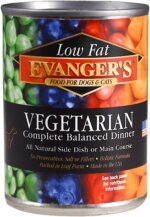
DogFoodAdvisor is reader supported See how
All reviews are 100% impartial but if you buy using links on this page, we may earn a referral fee.
What’s the best vegetarian dog food?
Dogs are omnivores, which means they can eat both animal and plant-based foods.
While dogs are biologically adapted to consume a diet that includes meat, it is possible for dogs to survive on a carefully planned vegetarian diet.
When considering a vegetarian diet for your dog, keep the following points in mind:
Dogs have specific nutritional needs, including essential amino acids (building blocks of protein), vitamins, and minerals, that are traditionally met through a diet that includes animal-based proteins. Whatever diet you choose for your dog – meat or plant based, it’s crucial to ensure that they get all the necessary nutrients to maintain good health.
Dogs require high-quality protein to thrive. Plant-based protein sources like soy, lentils, chickpeas, and quinoa can be used, but they may not provide all the essential amino acids in the right proportions. Combining different plant-based protein sources may help address this issue.
It’s likely that your dog will need some supplementation to meet their nutritional needs adequately. Specific nutrients, such as vitamin B12, taurine, and certain fatty acids, are primarily found in animal-based sources and may need to be added to a vegetarian diet.
Every dog is unique, and what works for one dog may not work for another. Some dogs may adapt well to a vegetarian diet, while others may experience health issues or deficiencies. Before making any significant changes to your dog’s diet, consult with a veterinarian or a veterinary nutritionist. They can assess your dog’s specific needs and help you develop a balanced vegetarian diet plan, or recommend alternative diets that align with your values while meeting your dog’s nutritional requirements.
If you’re considering a vegetarian diet for ethical or personal reasons, it’s crucial to prioritize your dog’s health and well-being. Always consult a professional to ensure your dog’s diet is nutritionally complete and appropriate for their individual needs.
You might also find this article Can Dogs Be Vegetarian or Vegan? by the founder of the Dog Food Advisor, Dr Mike Sagman, helpful.
Below, you can read our recommendations of the best vegetarian dog food. You’ll also learn the answer to each of the most frequently asked questions we get about vegetarian dog food.
Please note: We are sure you’ve noticed that these vegetarian foods are currently unrated. This is because our review methodology favors dog foods rich in meat, and judging a plant-based diet against this criteria would always give a low rating. Studies of plant-based diets for dogs are showing some great results, as well as providing preferable options for many dogs with allergies or those wanting to choose more environmentally sustainable options. We’ll leave these unrated whilst we consider how best to rate this new offering within the dog food market.
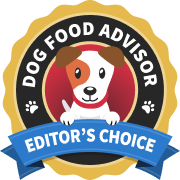
Best Vegetarian Dog Food December 2025
Here are The Dog Food Advisor's best vegetarian dog food brands for December 2025
-
Best Dry Vegetarian Dog Food
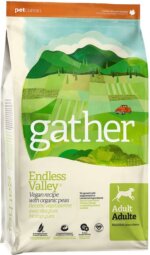
Gather Endless Valley Vegan Recipe
UnratedGather Endless Valley Vegan Recipe is one of two dry dog foods included in our review of the Gather product line.
This plant-based dog food is crafted with high-quality, sustainable ingredients. It features organic peas as its primary protein source and includes non-GMO and grain-free ingredients, making it suitable for dogs with sensitivities or allergies.
It contains omega fatty acids to promote healthy skin and coat while avoiding animal products, artificial additives, and common allergens like wheat, corn, and soy.
Dry matter label analysis reveals the recipe contains 24.4% protein, 12.2% fat and 55.3% estimated carbs… resulting in a fat-to-protein ratio of about 50%.
Read our review of the full Gather Dog Food (Dry) range here
Things we like
- Organic ingredients
- High in protein
- No artificial additives
Main Ingredients Organic peas, organic barley, organic oats, lentils, organic sunflower oil (preserved with mixed tocopherols) Type Grain-Free Protein Percentage 24.4% AAFCO Standards Adult Maintenance Best For Puppies and Dogs Sample buyer review...
Read more buyer reviews at GatherPetFood.com"My senior cocker spaniel came to life on this food. She developed more of a spunky personality. I think it gave her more energy and she’s so much happier. Love this food."
-
Best Vegetarian Food for Senior Dogs
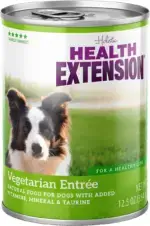
Health Extension Vegetarian Entrée
UnratedHealth Extension Vegetarian Entrée is one of nine wet recipes included in our review of this canned product line.
The formula is packed with highly nourishing ingredients such as sweet potatoes, butternut squash, carrots, peas, blueberries, cranberries, and kale, which are easy to digest and provide energy. These features are particularly beneficial for senior dogs with sensitive digestive systems.
Dry matter label analysis reveals the recipe contains 29.2% protein, 8.3% fat and 54.5% estimated carbs… resulting in a fat-to-protein ratio of about 29%.
Read our review of the full Health Extension Dog Food (Canned) range here
Things we like
- Easily digestible
- Packed with protein
- Helps ease sensitive stomach issues
Main Ingredients Sweet potatoes, butternut squash, water sufficient for processing, brown rice, carrots Type Grain-Inclusive Protein Percentage 29.2% AAFCO Standards Adult Maintenance Best For Adult and Senior Dogs Sample buyer review...
Read more buyer reviews at HealthExtension.com"My dogs loved it. A good product for the money! Great ingredients, thanks!"
-
Best Vegetarian Dog Food for a Sensitive Stomach
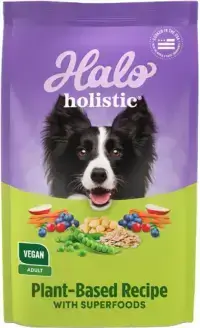
Halo
UnratedHalo Holistic Vegan Dog Food Complete Digestive Health Plant-Based Recipe With Superfoods is one of six dry recipes included in our review of this dry product line.
Dry matter label analysis reveals the recipe contains 29.7% protein, 16.5% fat and 45.8% estimated carbs… resulting a fat-to-protein ratio of about 56%.
This plant-based recipe is made with sustainable, humane ingredients that provide complete and balanced nutrition. Made with 100% vegan ingredients, it includes high-quality plant protein and no animal ingredients, which means lower greenhouse gas emissions. It also contains prebiotics, probiotics, and postbiotics, which work together to improve digestion and support the immune system. These elements aid in breaking down food effectively and maintaining a balanced gut microbiome.
Read our review of the full Halo Holistic Healthy Grains Dog Food (Dry) range here
Things we like
- Non GMO ingredients
- Complete & balanced
- Pre-, pro- and postbiotics
Main Ingredients Oats, peas, chickpeas, potato protein, brewers dried yeast Type Grain-Inclusive Protein Percentage 29.7% AAFCO Standards Maintenance Best For Dogs and senior dogs Sample buyer review...
Read more buyer reviews at HaloPets.com"I eat plant-based food so I’m happy there’s this great option for my pup too. He loves it!"
-
Best Vegetarian Dog Food for Picky-Eaters
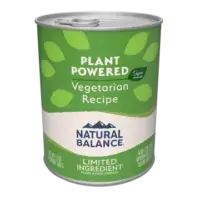
Natural Balance Limited Ingredient Vegetarian recipe
UnratedNatural Balance Limited Ingredient Vegetarian is one of eight wet recipes included in our review of this limited ingredient product line.
This plant powered recipe provides a complete and balanced meal for picky eaters who might experience sensitivities to certain animal proteins. Dry matter label analysis reveals the recipe contains 22.7% protein, 13.6% fat and 55.6% estimated carbs… resulting in a fat-to-protein ratio of about 60%.
Made with wholesome grains like brown rice, barley, and oat groats. Potatoes and peas provide complex carbohydrates. Vegetable broth adds flavor for a delicious meal to appeal to more finicky dogs.
Read our review of the full Natural Balance Limited Ingredient Dog Food (Wet) range here
Things we like
- Flavorsome broth
- Complete & balanced
- Wholesome grains
Main Ingredients Vegetable broth, potatoes , ground brown rice, ground barley, oats Type Grain-Inclusive Protein Percentage 22.7% AAFCO Standards Adult Maintenance Best For Dogs Sample buyer review...
Read more buyer reviews at Chewy.com"Since I started giving this dog food to my dogs, their liver enzymes have decreased. I made the mistake of changing to another brand’s vegetarian diet and their enzymes increased in both dogs. Now, I will just stick to the brand that is healthier for them. I want them to have a long life"
-
Best Affordable VegetarianDog Food
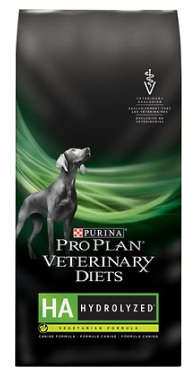
Purina Pro Plan Veterinary Diets HA Hydrolyzed Vegetarian Formula
UnratedPurina Pro Plan Veterinary Diets HA Hydrolyzed Vegetarian Formula is one of two recipes in our review of this popular product line.
This specialized dog food is designed to address dietary sensitivities and allergies in dogs. Its key features include a hydrolyzed protein source (broken down into smaller components to reduce allergic reactions) and a single carbohydrate source to minimize potential triggers. This formula aims to support digestive health with easily digestible ingredients, high-quality protein, and antioxidants.
Dry matter label analysis reveals it has a protein reading of 20%, a fat level of 9% and estimated carbohydrates of about 63%.
Read our review of the full Purina Pro Plan Veterinary Diets HA Dog Food (Dry) range here
Things we like
- Hydrolyzed protein source
- Easily digestible
- High quality protein
Main Ingredients Corn starch, hydrolyzed soy protein isolate, coconut oil, partially hydrogenated canola oil preserved with TBHQ, powdered cellulose Texture Dry Protein Percentage 20% AAFCO Standards Maintenance Best For Adult dogs Sample buyer review...
"Elijah, my poor nine year-old started getting skin allergies around his eye from proteins and low-grade dog foods. I bought this, as recommended and prescribed by my veterinarian, and he feels so much better and his skin is clearing up. Great product, healthy, and good for allergenic dogs"
-
Best Vegetarian Dog Food for Puppies
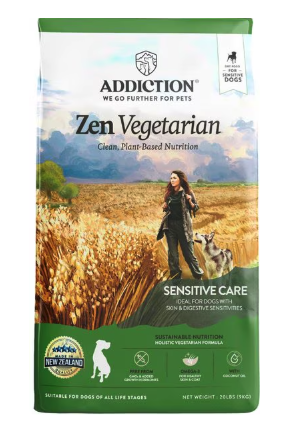
Addiction Zen Vegetarian
UnratedAddiction Zen Vegetarian is one of seven foods in our review of this dry product line.
It is well-suited for puppies due to its balanced, plant-based formulation specifically designed to support growth and overall health.
Free from common allergens like chicken, beef, and pork, which can cause sensitivities, this recipe instead, uses vegetable-based proteins and nutrients that are gentle on the digestive system, making it ideal for puppies with food sensitivities
The food is also enriched with essential vitamins, chelated minerals for better absorption, and taurine to promote healthy development, particularly for heart and eye health. The addition of omega-3 fatty acids from flaxseed and coconut oil supports a shiny coat and healthy skin.
Things we like
- Gentle on digestive system
- Enriched with essential vitamins
- Contains chelated minerals
Main Ingredients Oats, soybean meal, rice, peas, coconut oil, dried kelp Type Dry Protein Percentage 24.4 AAFCO Standards All Life Stages Best For All dogs and puppies -
Best Vegetarian Dog Food for Large Breeds
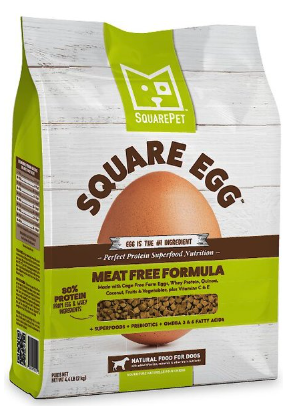
Square Egg Meat Free recipe
UnratedSquare Egg Meat Free Formula is one of 10 foods in our review of this dry product line.
Dry matter label analysis reveals it is made up of 28% protein content, 18% fat and an estimated 46% carbohydrates . . . with a fat to protein ratio of 64%.
This recipe harnesses the power of eggs to provide dogs with essential protein and amino acids that encourage growth and overall health. It contains superfoods to supports better digestion and the immune system, alongside omega 3 and 6 fatty acids to achieve total wellbeing.
Things we like
- Amino acids from whey protein
- High in protein
- Free from artifical flavors and colors
Main Ingredients Whole egg, whey protein concentrate, quinoa, brown rice, tapioca Texture Dry Protein Percentage 28% AAFCO Standards All Life Stages Best For All dogs including puppies Sample buyer review...
Read more buyer reviews"My two-year-old Basset Hound had chronic ear infections and a really sensitive stomach, we finally decided to get him environmental/food allergy tested and discovered he is allergic to much of the outside world so he would need an egg/potato or hydrolyzed diet. After doing some trials on different foods I fortunately stumbled across this brand decided to give it a try and I am so so glad I did. Arthur has had major improvement on this kibble, I add different produce toppers to keep things interesting because after my research on prescription kibble I knew Arthur would not like it. Not saying this food is a one size fits all, but we are very thankful and happy to have found something for our sweet boy."
-
Best Vegetarian Dog Food for Small Breeds
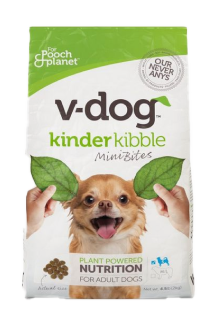
V-Dog Kinder Kibble Mini Bites
UnratedV-Dog Kind Kibble Mini Bites is an ideal vegetarian food for small breeds due to it’s small kibble chunks.
This recipe is made from 100% vegan whole foods like peas, lentils, quinoa and brown rice. It does not include corn, soy, wheat or gluten to eliminate allergic reactions, improve oral hygiene, support healthy skin and coat, and provide effective weight management.
The dashboard displays a dry matter protein reading of 27%, a fat level of 10% and estimated carbohydrates of about 55% and a fat-to-protein ratio of about 38%.
Things we like
- Small kibble
- Gluten free
- Includes whole foods
Main Ingredients Dried peas, pea protein, brown rice, oatmeal, potato protein Texture Dry Protein Percentage 27% AAFCO Standards Maintenance Best For Dogs including small breeds Sample buyer review...
Read more buyer reviews"As vegans we knew that we wanted our new pup to thrive on the same diet as we do. Transitioning was easy. She loves it and she poops like a champ! Thank you for this awesome product."
More Top Picks
To view more top dog foods by category… click the link below that best meets your personal feeding needs.
Here are the most frequently asked questions we get about feeding vegetarian food:
Frequently Asked Questions
Is a vegetarian diet nutritionally complete for dogs, and can it meet all their dietary requirements?
Vegetarian diets are now available which are nutritionally complete.
Dogs have certain essential nutrient requirements that must be met to maintain good health, and these nutrients are typically obtained from animal-based sources. When transitioning a dog to a vegetarian diet, it’s essential to find suitable plant-based alternatives to meet their nutritional needs.
Some key nutrients that are crucial for dogs and may require special attention in a vegetarian diet include:
- Protein: Dogs require high-quality protein with all essential amino acids. Plant-based protein sources like soy, lentils, chickpeas, quinoa, and peas can be used, but they may not provide all amino acids in the right proportions. Careful combinations of plant based proteins are used to balance the amino acids supplied to the proportions needed.
- Vitamin B12: Vitamin B12 is primarily found in animal-based foods. In a vegetarian diet for dogs, a reliable source of vitamin B12 must be included through supplements or fortified foods.
- Taurine: Taurine is an essential amino acid for dogs, and it is mostly found in animal tissues. It is crucial to ensure adequate taurine intake in a vegetarian diet, especially for certain dog breeds that are prone to taurine deficiency-related issues.
- Omega-3 fatty acids: Dogs require omega-3 fatty acids, such as EPA and DHA, which are commonly found in fish oil. Alternative sources like algae-based supplements can be used in a vegetarian diet to provide these essential fatty acids.
- Iron: Plant-based iron sources like lentils, tofu, and leafy greens can be used, but they may not be as easily absorbed as heme iron found in animal-based foods. Combining iron-rich plant foods with vitamin C-rich foods can enhance iron absorption.
- Calcium and phosphorus: These minerals are essential for bone health. Care should be taken to ensure proper calcium-to-phosphorus ratios, as well as adequate intake of calcium in a vegetarian diet.
- Zinc: Plant-based zinc sources like legumes and whole grains can be used, but their bioavailability may be lower than in animal-based foods.
What are the potential health risks or deficiencies associated with a vegetarian diet for dogs?
Feeding dogs a vegetarian diet can present several potential health risks and deficiencies if not carefully managed. While some dogs may adapt well to a well-balanced vegetarian diet, others may be more susceptible to certain issues.
As mentioned above, dogs require high-quality protein with all essential amino acids to maintain their health and muscle mass. Plant-based proteins may lack certain amino acids, and without proper planning, dogs could suffer from protein deficiencies.
Taurine is an essential amino acid for dogs, and it is primarily found in animal-based proteins. A lack of taurine in a vegetarian diet can lead to serious health problems, including heart disease and eye issues.
Vitamin B12 is only naturally found in animal-based foods. Without supplementation or fortified foods, dogs on a vegetarian diet may not get enough vitamin B12, leading to anemia, nerve problems, and overall weakness.
Omega-3 fatty acids, such as EPA and DHA, are essential for a dog’s skin, coat, and overall health. While some plant sources provide omega-3s in the form of ALA, they may not be efficiently converted to the active forms (EPA and DHA) that dogs need.
Dogs need a proper balance of calcium and phosphorus for healthy bone development and maintenance. Without careful design plant-based diets may have an inadequate balance of these minerals, leading to bone and dental issues.
Some dogs might have difficulty digesting certain plant-based proteins or high-fiber diets, leading to gastrointestinal discomfort, gas, or diarrhea. For other dogs this higher fiber diet and plant based proteins may suit them better than a traditional diet.
Plant-based diets may not provide enough calories for highly active dogs or those with higher energy needs, such as working dogs or athletes.
Like all protein sources and ingredients, there is the potential that dogs can develop allergies to specific plant-based proteins or other components in a vegetarian diet, leading to skin issues, ear infections, or gastrointestinal problems. For dogs with allergies to animal-based ingredients a vegetarian diet can be a great option to alleviate their allergy symptoms.
In all cases, inadequate nutrition can impact reproductive health, leading to decreased fertility and complications during pregnancy and lactation.
Some dogs might exhibit changes in behavior or energy levels if their nutritional needs are not adequately met, affecting their overall well-being.
To mitigate these potential risks, it’s essential to work with a veterinarian or a veterinary nutritionist to design a balanced vegetarian diet that meets the specific needs of the individual dog. Regular health check-ups and monitoring are crucial to address any deficiencies or health issues promptly.
In some cases, a vegetarian diet might not be suitable for certain dogs, and alternative dietary approaches may be recommended to ensure optimal health and well-being. Many vegetarian diets are formulated to meet AAFCO nutritional profiles and carefully supply the nutrients required by your dog.
As with any dietary change it is important to monitor your dog for signs that the diet isn’t suiting them.
You can also support their diet with specific supplements and fortified foods to ensure they receive the essential nutrients they need including Vitamin B12 supplements, protein supplements and calcium supplements.
What are some signs that my dog may not be thriving on a vegetarian diet?
If you have transitioned your dog to a vegetarian diet, it’s essential to monitor their health and well-being closely to ensure they are thriving and getting all the necessary nutrients.
Here are some signs that your dog may not be thriving on a vegetarian diet:
- Weight loss or weight gain: Significant changes in your dog’s weight, either gaining or losing weight, can indicate an issue with their diet. Sudden weight loss may be a sign of inadequate calorie intake or nutrient deficiencies, while weight gain could result from excessive carbohydrate consumption.
- Dull coat or skin issues: A lack of essential fatty acids, such as omega-3s, can lead to a dull, dry coat and skin problems like flakiness, itching, or irritation.
- Lethargy or decreased energy levels: If your dog seems less active or lethargic, it could be a sign of insufficient energy intake or a deficiency in vital nutrients.
- Muscle loss or weakness: Inadequate protein intake can lead to muscle loss, weakness, and a decrease in muscle mass.
- Gastrointestinal issues: Diarrhea, vomiting, gas, or other digestive problems can be indicators of dietary issues or sensitivities to certain ingredients in the vegetarian diet. Remember whenever changing your dog’s food to do it gradually to reduce the chances of digestive upset.
- Changes in behavior: Behavioral changes, such as increased irritability or aggression, could be linked to nutritional deficiencies affecting your dog’s overall well-being.
- Dental problems: Poor nutrition can impact dental health, leading to issues like tooth decay or gum disease.
- Frequent illness or weakened immune system: A lack of essential nutrients can compromise your dog’s immune system, making them more susceptible to infections and illnesses.
- Slow growth or development in puppies: Puppies require specific nutrients for proper growth and development. A vegetarian diet that does not meet these needs can result in stunted growth or developmental issues.
- Urinary issues: Unbalanced mineral intake can lead to urinary problems, including the formation of urinary stones or crystals.
- Behavioral signs of food-seeking: If your dog seems to be constantly searching for food or eating non-food items (pica), it may indicate that they are not getting enough satisfaction or nutrients from their current diet.
If you observe any of these signs or have concerns about your dog’s health and well-being on a vegetarian diet, it’s crucial to consult with a veterinarian or a veterinary nutritionist. They can assess your dog’s specific needs and help you make any necessary adjustments to the diet or recommend alternative dietary options to ensure your dog’s health is not compromised
Final word
The Dog Food Advisor does not accept money, gifts, samples or other incentives in exchange for special consideration in preparing our reviews.
However, we do receive a referral fee from online retailers (like Chewy or Amazon) and from sellers of perishable pet food when readers click over to their websites from ours. This helps cover the cost of operation of our free blog. Thanks for your support.
For more information, please visit our Disclaimer and Disclosure page.






